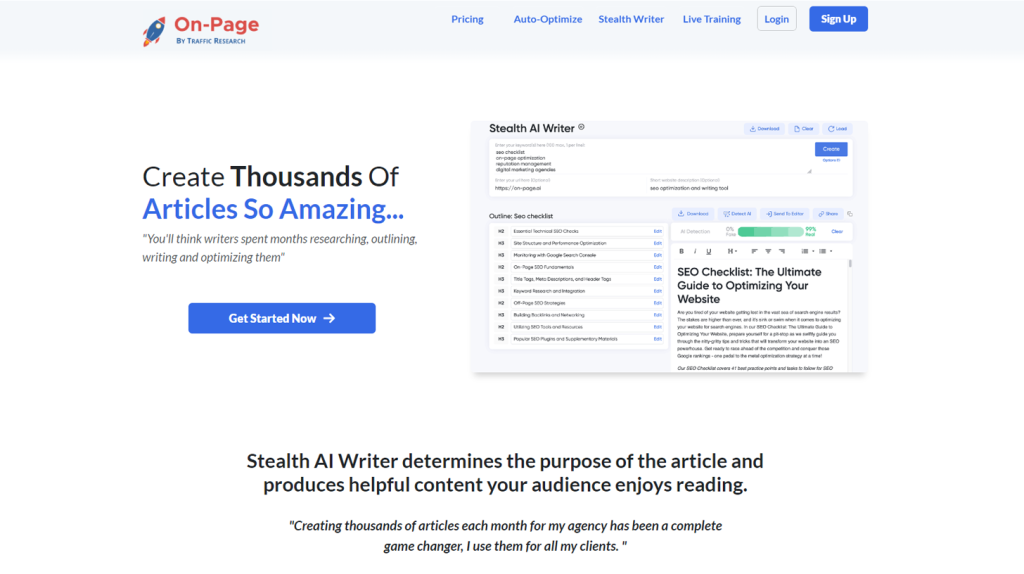Picture this: you’re about to embark on a thrilling river rafting adventure, and you need to choose a guide. Do you pick the person with years of experience and certifications in water safety, or someone who just “kind of knows” what they’re doing? The answer is obvious – you want an expert to ensure your ride goes smoothly and safely. In the world of search engine optimization, Google follows the same mindset with E-E-A-T: Experience, Expertise, Authority, and Trust. Like a seasoned adventurer navigating treacherous waters, E-E-A-T shapes how websites are ranked on Search Engine Results Pages (SERPs). Let’s dive into the depths of E-E-A-T and learn why it’s crucial for both content creators and SEO professionals to understand its impact on website ranking.

E-E-A-T stands for Experience, Expertise, Authoritativeness, and Trustworthiness. In SEO, E-E-A-T represents a set of quality criteria that Google uses to assess the value and relevance of webpages. It’s important because search engines like Google want to provide the most authoritative and trustworthy results for users’ queries, particularly those related to Your Money or Your Life (YMYL) topics such as health, finance, and safety. Websites with strong E-E-A-T signals are more likely to rank higher on search engine results pages (SERPs) and attract more traffic than those without them. Therefore, creating high-quality content that demonstrates expertise, authoritativeness, and trustworthiness on YMYL topics can positively impact your website’s E-E-A-T score and improve your overall SEO performance.
Exploring What it Means to be E-E-A-T
In the world of search engine optimization (SEO), there’s a term that you should know if you want to improve your website’s rankings on Google: E-E-A-T or Experience, Expertise, Authority, and Trustworthiness. But what exactly does it mean to have good E-E-A-T? Why is it important for your business? And how can you improve it?
To start with, let’s quickly define each component:
Experience

Experience pertains to the level of interaction visitors have with your website. A positive experience will make them stay longer, while a negative one may lead to immediate exits.
Expertise

Expertise represents the knowledge and skills required to provide accurate and helpful information in a particular niche. This is especially essential for YMYL (Your Money or Your Life) topics such as finance, health, and law which can affect people’s lives profoundly. Need help showcasing your expertise? This is where On-Page.ai really excels. This SEO tool can quickly create and optimize high-quality, accurate articles about your business or niche.
Authority

Authority refers to the reputation and reliability of both the website and its authors. Are they qualified to provide the information they present?
Trustworthiness

Trustworthiness deals with the transparency, honesty, and consistency of information provided from the articles’ inception up until when presented on a site.
Good E-E-A-T means having all four components working together harmoniously giving credibility to your website content.
For instance, if someone is looking for financial advice on investing in mutual funds and they stumble across an article that was published by someone without any professional qualifications or relevant credentials, it would be natural for them not to trust that article. Not only is this individual not qualified to offer investment advice but also lacks authority and trustworthiness.
The key takeaway here is that E-E-A-T is essential because it signals professionalism and integrity – qualities valued by both clients and Google.
- In the world of SEO, having good E-E-A-T (Experience, Expertise, Authority, Trustworthiness) is crucial for improving website rankings on Google. Good E-E-A-T means all four components are working together harmoniously to provide credibility to website content. This signals professionalism and integrity, which are qualities highly valued by clients and Google. It’s especially vital for niches like finance, health, and law that can affect people’s lives significantly. Focusing on improving E-E-A-T will result in a better user experience and increased online visibility.
Experience
When talking about E-E-A-T concepts in digital marketing campaigns, user experience has become synonymous with creating online success. Numerous studies show that a better user experience on your website leads to more sales and revenue, so you must strive to make your visitors feel welcome.
Think of your website as an inviting storefront. The outside appearance represents how Google views your site while the parts that make up the store implies the UX design. A well-designed store is optimized, efficient, easy to navigate with clear pathways, provokes curiosity, and heuristics that appeal to potential customers’ tendencies. Similarly, when creating content for websites, one should opt for headers, bullet points, white space between paragraphs to regulate attention whilst creating an aesthetic sensibility.
It all boils down to making sure that everything on your website is easily accessible and intuitive creating good user experience.
It’s always a good idea to optimize content so it’s readable and skimmable while putting the most important information front and center. Large blocks of text without structure can lead users to leave quickly or lose important key takeaways; people tend not to read but scan the page for relevant information.
In addition, using images or videos where appropriate can also enhance the user experience. Many consumers are more inclined towards visuals and would sometimes favor digesting them over text-based articles.
If optimizing user experience involves creating an easy-to-use interface and taking into account visitor preferences, then establishing authority revolves around proving industry expertise from business practises and transparently providing this within published content.
Expertise
Expertise is an essential component of E-E-A-T, and it refers to the knowledge or qualifications on a particular topic. Google wants to present valuable and accurate information to its users, so websites with a higher level of expertise are more likely to rank higher than others.
A good example of expertise in practice can be seen on health-related websites. Sites that publish content related to medical conditions must have authors who are experts in the field with years of experience. If a website peddles inaccurate information regarding life-threatening diseases, it could cause harm to people who trust their advice.
To demonstrate expertise, you need to provide proof of your credentials or experience on the topic you are writing about. For instance, if you’re an accountant who owns a financial blog, having a CPA certification would add credibility to the content you generate.
In the digital marketing field, it’s easy to spot individuals or businesses without real expertise pushing out shallow content for clicks and ad impressions. This type of approach might work in the short term but eventually harms their reputation significantly when readers realize it lacks substance.
But with well-researched content generated by an advanced AI writing tool like Stealth Writer, you can effectively and quickly showcase your expertise in your biz or niche.
Ultimately, expertise is determined by both search engine algorithms and human evaluators who analyze content quality based on certain guidelines set forth by Google’s Search Quality Rater Guidelines (QSRG). Up next, let’s take a deeper dive into another vital trait within E-E-A-T: Trustworthiness.

Trustworthiness
Trustworthiness, as the name suggests, refers to how much trust your website visitors have in your brand, content, and overall business. With so much information readily available online about various topics, it can be challenging to determine which sources to trust. Therefore, establishing trust is a vital part of E-E-A-T, especially when creating content around YMYL topics.
Suppose you’re searching for weight loss programs or dietary changes in a search engine. In that case, Google will prioritize displaying websites having high E-E-A-T indicators directly related to weight loss experts or people who genuinely tried and tested these programs with beneficial results.
One way to establish trust is by being transparent about your brand’s operations and ethos. This means having an editorial policy detailing how you create content and ensure accuracy or showing any disclaimers when applicable. Additionally, offering several customer service channels like email or phone numbers where clients can reach out for dispute resolution further builds trust.
A simple analogy emphasizing trustworthiness is comparing a client-company relationship to personal relationships among individuals. Imagine going on first dates with dishonest people who are using fake names, taking credit for other’s achievements etc. Would you ever feel comfortable reaching out again?
Another approach is adding social proof to your website that showcases positive reviews or testimonials from past customers or clients. People tend to trust businesses that have been vetted by others more than anonymous brands they just discovered online – even if they rank high enough for their search queries.
It’s worth mentioning that building trust takes time and effort with measurable outcomes often being subjective or hard-to-track. Ultimately, creating valuable content and showcasing transparency in your operations while staying relevant to the audience’s needs will slowly but surely establish better credibility over time – consequently building trust not only among search engines but earning loyal readership too!
With two major components of E-E-A-T covered, let’s explore the practical strategies that businesses could take while marketing to keep these metrics high.
Applying E-E-A-T to Marketing Strategy

Marketing strategies must focus on creating a loyal customer base. E-E-A-T is an important concept that marketers can utilize while building their marketing strategies. By making considerations for factors such as experience, expertise, authoritativeness, and trustworthiness, companies can develop a multi-faceted marketing plan that keeps the customer at the forefront.
For instance, a health supplement company can utilize E-E-A-T by enhancing their website with accurate and trustworthy content provided by professional experts in the field. They may also engage nutritionists to share tips and improve user experience by providing an easy-to-navigate website that allows potential customers to find what they are looking for without breaking a sweat.
Another example is by providing valuable content for your audience, which can be easily done using our AI content optimizer, On-Page.ai. With just a few clicks, it can produce useful articles to help boost your content marketing strategy.
Ensuring that the product or service offered can actually deliver its promised benefits is an important part of developing credibility. Quality control methods for products are crucial in maintaining trustworthiness amongst customers. Customers will inevitably return if they receive the quality that they expect from a brand or company.
It is worth mentioning that while every entrepreneur wants high domain authority and credibility online, prompt feedback through reviews is easily capable of damaging reputations within seconds. Companies need to pay attention to negative reviews and remediate the situation quickly to preserve their domain authority.
Enhancing User Experience
A strong marketing strategy aside, sustaining credibility requires sustained efforts to enhance user experience at all levels of your business funnel. Businesses must ensure ensuring simplicity in website navigation, clear messaging about sales processes, integrity when handling personal details of clients and transparent pricing.
Let us consider a hotel booking website: Trustpilot or any review site displays both good and bad reviews about the hotel when customers search for feedback. A website with strong E-E-A-T will display relevant information on your webpage, including the hotel’s location, pricing, and amenities. Simultaneously, another detail-conscious feature could be the number of reviews displayed, demonstrating customer engagement.
Patagonia is a successful brand that has taken E-E-A-T to a new level with its commitment to environmental activism. The brand believes that it’s important to educate customers about sustainability while also selling products that align with their mission. Customers want to be associated with people who share their beliefs and support the causes they care about. Patagonia is an example of a brand demonstrating expertise by providing educational content on conservation and sharing ways for customers to get involved in various environmental campaigns.
While improved user experiences result in higher sales for businesses, having a good product can lead to faster returns through positive reviews from satisfied clients This outcome implies that industry leaders should concentrate not only on providing excellent products and services but also on improving all aspects of user interactions.
Building Trust through Content Development

When it comes to building trust with your audience, content development lies at the heart of a successful strategy. Creating high-quality content regularly and avoiding hiding it behind walls of ads will help increase your website’s E-E-A-T. To start, a clear and concise editorial policy can create an environment of trust between the website and its audience. It should describe the types of stories you plan to cover, how sources are vetted, and any relationships with advertisers or sponsors.
Aside from the editorial policy, there are practical steps that you can implement into your content creation process. One way is to create original content that aligns with your core brand values and messaging. Your content should bring value to the reader rather than just promoting a product or service. Additionally, including citations for trustworthy sources can benefit readers by providing additional information on related topics.
Another way to build trust is through consistency in your style and voice across different platforms. This includes social media channels, blogs, email campaigns, and other forms of digital advertising. A consistent tone in brand messaging helps build familiarity with the audience over time, which translates directly into trust.
For example, take a company that sells beauty products. By creating unique blog posts and videos on skincare tips or makeup trends that align with their brand values, they can not only promote their products but also provide valuable information to their audience. As a result, this builds trust with their consumers who see that they prioritize user benefit over profit.
Fortunately, Stealth Writer by On-Page.ai can help businesses and brands develop blog posts that are educational and engaging–and of course, rank high on SERPs.
Another way to foster user engagement is through a comments section on your website or blog posts. By soliciting feedback or opinions from your readers, you not only encourage participation but also show that you value their input.
In addition to having diverse content strategy as a means of building trust with users, credibility plays a huge role in gaining trustworthiness – which has everything to do with the sources you use.
Credible Sources and Transparency
Citing credible sources is crucial for providing accurate and useful information. The sources you cited could be from scientific publications, government websites, or industry experts. Conversely, citing an unreliable source can not only damage your website’s reputation but also put your readers at risk. Inaccuracy on YMYL topics can cause serious harm to people affected by the person who viewed the content.
When it comes to finding sources, there are a few practical steps you could use to ensure legitimacy. Firstly, avoid using anonymous sources or unsupported claims as these types of content will decrease your credibility. Secondly, check the source’s credentials. A quick search engine query can help identify if a source is qualified in their area of expertise.
Another important factor to consider is transparency about any relationships with advertisers or sponsors. Being transparent about financial interests helps build trust with consumers by showing that a company prioritizes honesty over profit.
Take an example of news reporting. An investigative journalist would have detailed information from reliable sources that could be shared with their readers. They provide evidence and authenticate any claims before releasing the news to the public. This transparency fosters greater trust between the journalist and their readers because they know they can trust them not to share unvetted or fake news.
There are several tools available online that can help verify your sources’ credibility such as Google Scholar or Web of Science where you can find articles validated by expert journalists.
However, some might argue that certain scenarios might make it challenging to find legitimate sources such as a breaking story where there might not be enough time for verification. While this might be true, outlining potential limitations when applicable is still essential in providing context for users.
To conclude, E-E-A-T concerns strategic aspects of digital advertising that should be taken into account if businesses aim to generate high-quality traffic towards their website, which On-Page.ai can certainly do and much more.
Establishing Authority in Digital Advertising

Digital advertising has revolutionized the way companies reach their target audience. In today’s world, it is essential to establish authority in digital advertising to stay ahead of the competition. E-E-A-T plays a crucial role in determining the authority of websites, and it also applies to digital ads.
One way to establish authority in digital advertising is by creating high-quality ads. The contents of the ad should be engaging, targeted, and relevant to the audience. A quality ad will often result in clicks, likes, shares, or even conversions, which will help build trust with the target audience.
Another effective way to establish authority through digital advertising is by creating SEO-friendly ads. By incorporating relevant keywords and optimizing ads for search engines, advertisers can increase their visibility and streamline their targeting efforts. Building authority through SEO-friendly content, including ads is On-Page.ai’s expertise. Be sure to check it out. It just might be what your business needs to level up your digital advertising efforts.
Furthermore, displaying customer reviews on an online ad can help establish authority. Social proof from satisfied customers is a powerful tool that can convince potential clients that your company is trustworthy.
For instance, suppose a new business looking to attract more customers to its website runs a Google Ad campaign with an ad designed to appeal to its target audience. However, if the ad is generic and unappealing or displays no social proof, it may not receive many clicks.
On the other hand, suppose a business runs another Google Ad campaign with targeted ad content that speaks directly to its customers’ needs and preferences. In that case, it’s more likely that users will click on it and take action because they feel like the company knows what they’re looking for.
Moreover, establishing authority through digital advertising is essential because it helps your brand distinguish itself from competitors. Suppose your brand consistently creates high-quality ads that deliver exceptional user experiences consistently. In that case, potential customers will begin to associate your products or services with high quality and view you as an industry leader.
To build a brand that your target customers trust and respect takes time, effort, and a strategic approach. The next section discusses how consistent brand messaging and reputation management can help maintain authority.
- According to a study conducted by Amsive Digital, more than two-thirds (68%) of marketers believe that Google’s emphasis on E-E-A-T has made their content marketing strategies more effective.
- A 2020 analysis by CanIRank revealed that sites with higher levels of E-E-A-T are 76% more likely to rank among the top three positions in Google search results.
- A research study conducted at the University of Michigan found that websites with high E-E-A-T scores had 5 times the average conversion rate as compared to those with low scores.
Consistent Brand Messaging and Reputation

Consistency in brand messaging is critical to establishing authority online, especially in today’s crowded digital marketplace. It means maintaining a recognizable message across all platforms where a customer may interact with your brand.
One way to ensure consistency is through effective content management strategies. This includes creating content that appeals to your ideal customer base, whether blog posts, social media updates, or email newsletters. If you’re looking to enhance your content development plan, consider writing with AI to help your brand craft compelling posts that your audience will find useful and relevant.
Another essential aspect of reputation management is transparency. By being open about your company’s goals, values, and activities through detailed About us pages, mission statements or charity affiliations, you will create a sense of authenticity that sets you apart from less transparent competitors.
For example, suppose a potential customer visits several websites looking for the best deal on used cars. They are more likely to trust and engage with a company whose website has comprehensive information about the car’s condition and transparent pricing than those whose websites don’t offer such transparency.
Consistent brand messaging helps boost conversions on your website while improving user experience overall. If the messaging remains consistent across the board – from product descriptions to website copy – then visitors are more likely to buy what you’re selling because they know what to expect from every interaction with your brand.
Boosting your website’s E-E-A-T score may sound intimidating and a lot of work, but with the right tools at your disposal, it’s not impossible. Also, don’t forget that On-Page.ai is here to support all your content optimization needs and help you rank a coveted spot on Google’s SERPs. Register today to get started.




